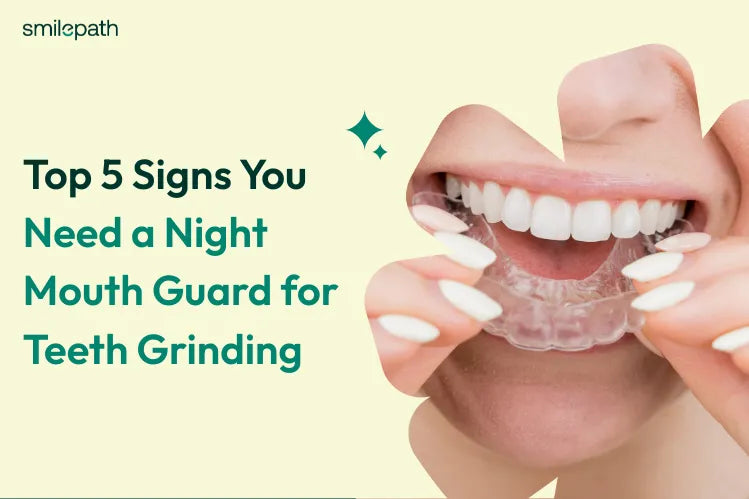
Table of Contents
Bruxism is an increasingly common dental issue. It refers to the grinding or clenching of teeth. If left untreated, bruxism can lead to severe issues such as tooth damage, jaw pain, headaches, earaches, and disrupted sleep. According to a survey published in the National Library of Medicine , 15% to 40% of children and approximately 8% to 10% of adults experience bruxism. In this blog, discover everything you need to know about bruxism, including common signs and effective treatment options like night mouth guards.

5 Signs You Need Treatment

If you often wake up with discomfort or notice subtle changes in your teeth and jaw, your body might be trying to tell you something. Bruxism often goes unnoticed until damage is already done. Here are common teeth-clenching symptoms that indicate you may need immediate treatment.
You Wake Up with Jaw Pain or Tightness
Morning jaw pain is one of the most common signs of teeth grinding. If your jaw feels sore, tense when you wake up, it's likely due to the excessive pressure placed on your teeth and jaw muscles during nighttime grinding.
You Get Frequent Headaches or Earaches
Grinding your teeth places stress on your facial and jaw muscles, and that tension can lead to regular headaches, especially in the temples. In some cases, the pain can radiate to your ears.
Your Teeth Look Worn Down or Chipped
Grinding causes your teeth to wear down unevenly. You might notice flattened edges, small chips, or increased sensitivity due to enamel erosion. If your smile is showing these signs, it's time to treat bruxism.
You Feel Tired Despite a Full Night’s Sleep
Do you sleep for 7–8 hours yet still feel lazy in the morning? Bruxism can disrupt your deep sleep cycles, even if you don't fully wake up during the night.
Your Jaw Clicks or Pops
Clicking, popping, or discomfort when opening and closing your mouth may signal TMJ disorder, which is often worsened by grinding.
Recommended Treatment

Wondering how to stop teeth grinding at night? Here's your answer: dental appliances that can effectively treat bruxism include a custom-made night mouth guard. A tailored night guard for bruxism prevents teeth grinding and clenching at night and ensures you sleep peacefully.
How Long Should You Use a Night Mouth Guard?
Unfortunately, there isn’t any specific treatment duration for teeth grinding. It depends on the severity of your case. Some people see visible results in 6 months; however, others might see results in a year or more.
Smilepath Night Guards

Smilepath offers custom-made night guards that are the best bruxism protection for mild to severe cases. Below are the variations of Smilepath custom night guards.
- Soft Night Guards: Smilepath soft night guards are made up of softer material, ideal for mild bruxism cases.
- Hard Night Guards: If you are a heavy teeth grinder, Smilepath hard night guards are the most convenient and go-to option for you.
- Hybrid Night Guards: Smilepath hybrid night guards are made up of dual-layered material, ideal for mild to severe teeth grinders.
Why Choose Smilepath Night Guards?
- Sung-fit: Comfortable fit as night guards are custom-made to your dental structure.
- Affordable: One of the most effective and affordable ways to treat your teeth grinding.
- 100% remote: No need to leave your home to treat bruxism.
- Easy breathing: Its comfortable fit allows you to enjoy easy breathing all night.
Protect Your Smile before It’s Too Late
Teeth grinding, or bruxism, is more than just a nighttime habit. It’s a serious dental concern that can affect your overall well-being if left untreated. From jaw pain and headaches to worn-down teeth and disturbed sleep, the symptoms are often silent until the damage becomes noticeable.
One of the most effective solutions is using a dental guard for sleeping to prevent night grinding and protect your smile, like those offered by Smilepath . It is a simple yet highly effective solution to prevent further harm. Whether you're dealing with mild or severe grinding, early intervention can protect your smile and improve your quality of sleep.
FAQs
If you wake up with jaw pain, headache, or earache, it's time for you to use a night guard.
A night guard can feel bulky and may cause excess saliva in the initial days.
Yes, you need a night guard if you grind your teeth at night. Leaving it untreated can cause severe dental issues in the long run.
If you feel a stiff jaw, have a severe headache or earache, there’s a high chance is that you grind your teeth at night.
Citations:
5 signs you might need a nightguard. (n.d.). Washington Court House Dental. https://www.wchdental.com/articles/signs-you-might-need-a-nightguard
Colgate. (2023, January 26). Mouth guard for teeth grinding: Five signs You Need one. https://www.colgate.com/en-ph/oral-health/bruxism/mouth-guard-for-teeth-grinding-five-signs-you-need-one-0214





 Australia
Australia New Zealand
New Zealand Malaysia
Malaysia English
English Portuguese
Portuguese English
English English
English English
English English
English English
English Canada
Canada